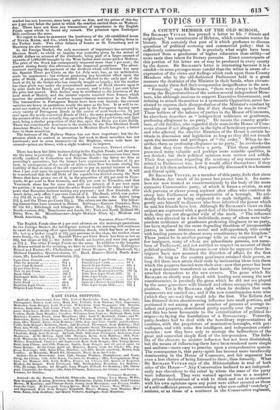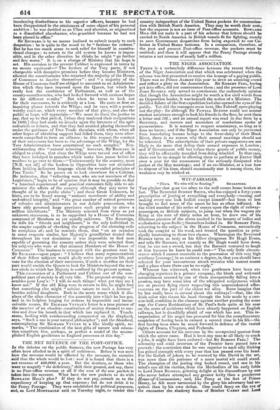TOPICS OF THE DAY.
A COUNTY MEMBER OF THE OLD SCHOOL.
SIR RICHARD VYVYAN has penned a letter to his " friends and neighbours," his constituents of Helston, which contains matter for history. Not certainly that part of it which professes to discuss questions of political economy and commercial policy : that is sufficiently commonplace. It is precisely what might have been expected from a gentleman of higher education than ability—of more taste than talent for literary pursuits. Exact counterparts of this portion of his letter are or may be produced in every county by the dozen. Sir RICHARD'S letter is interesting because it is a candid—in some passages more candid than the writer is aware of— expression of the views and feelings which rush upon those County Members who in the old-fashioned Parliament held in a great measure the destinies of the Minister in their hands, when circum- stances make them feel their comparative insignificance in the new. " Formerly," says Sir RICHARD, " there were always to be found among the Representatives of the nation several independent Mem- bers, who although anxious to support Executive Government, and refusing to attach themselves to a systematic Opposition, never he- sitated to express their disapprobation of the Minister's conduct by speaking or acting against him if they thought he was in error.' These holders of the balance of parties in the House of Commons, be elsewhere describes as " independent noblemen or gentlemen, professing allegiance to no party." He means the country gentle- men, of old families, who regarded their seats in the House of Com- mons almost if not altogether in the light of hereditary possessions ; and who allowed the elective Members of the House a certain la- titude in discussion and legislation so long as they did not trench upon the interests and privileges of " the order." When he de- scribes them as professing allegiance to no party," he overlooks the fact that they were themselves a party. That those gentlemen possessed many valuable and perhaps more amiable qualities, is not denied ; but their political opinions were narrow and selfish. Their first question regarding the tendency of any measure sub- mitted to Parliament was, how it would affect themselves: if they found it left them unharmed, they generally discussed it in a humane and liberal spirit. Sir RICHARD VYVYAN, as a member of this party, feels that since the Reform Act much of its power has passed from it. Its mem- bers are now treated as unceremoniously by the body of the more extensive Conservative party, of which it forms a section, as any rich parvenu or clever young aspirant after office who contrives to creep into Parliament as representative of a borough. He evi- dently feels sore at being subjected to such indignity, and dili- gently sets himself to discover who have inherited the power which he and his friends have lost. Although Sir Ricusan's views on this subject are expressed with a good deal of the bitterness lie naturally feels, they are not altogether wide of the mark. " The influence which was directed by a few individuals, many of whom were inde- pendent noblemen or gentlemen professing allegiance to no party, has been replaced by the more degrading thraldom of irresponsible juntos, in some instances secret and self-appointed, who confer with leading persons in almost every constituency in the kingdom." These juntos be in another passage tells us are composed of " a few intriguers, many of whom are subordinate persons, not mem- bers of Parliament, and not entitled to respect on account of their political position." Sir RICHARD is out when he supposes these in- triguers have now assumed the direction of affairs for the first time. So long as the country gentlemen retained their power, so long did these men attain their ends by insinuating ideas into them which the puppets fancied were their own : now that power has been in a great measure transferred to other hands, the intriguers have attached themselves to the new owners. The game which Sir RICHARD so clearly sees played with leading men among the new constituencies, is precisely the game which he did not see played by the same gamesters with himself and others occupying the same position. Yet is Sir RICHARD right when he declares that such manoeuvres are carried on ; and if the new constituencies were wise (which they are not) they would take the hint. The Reform Act has frittered down electioneering influence into small portions, and portioned it out among a great number of persons of average in- tellect and property, distributed pretty equally over the country : and this has been favourable to the centralization of political in- trigue—to laying the foundations of a Bureaucracy. Formerly, party-leaders had to deal with the hereditary representatives of counties, with the proprietors of nomination-boroughs, with pot- wallopers, and with some few intelligent and independent consti- tuencies : now they have only to manage the bellwethers of the great and somewhat simple flock of the ten-pounders. The liabi- lity of the electors to sinister influence has not been diminished, but the means of influencing them have been rendered more simple and uniform—more easy to practise upon a comprehensive system. The consequence is, that party-spirit has become more barefacedly domineering in the House of Commons, and fair argument has even a less chance of being listened to there, than formerly. What Sir RICHARD VYVYAN says of the Ministerialists is true of both sides of the House—" Any Conservative inclined to act independ- ently was obnoxious to the cabal by whom the mass of the party were influenced. They were warned against him as a marplot : his private declarations of a wish to think and act in accordance with his own opinions upon any point were either scouted as those of a self-sufficient person, entertaining what were called' crotchety' notions, or as those of a mutineer in the Conservative regiment,
inculcating disobedience to his superior officers, because he had been disappointed in the attainment of some object ofthis personal ambition : he was derided as an Ultra and alarmist, or stigmatized as a dissatisfied placehunter, who grumbled because he had not been placed in office." Sir Mensal) is by no means inclined to submit tamely to such despotism : be is quite in the mood to be " factious for redress." But he has too much sense to seek relief for himself in constitu- tional changes : to return to the old system he knows is impos- sible, and in the other direction he thinks he might " go further and fare worse." It is on a change of Ministry that his hope is set. His aversion to the present Cabinet is expressed in terms by no means equivocal—" The leaders of the Tory party, if not chargeable with deceptive promises before they became Ministers, allowed the constituencies who returned the majority of the House of Commons to deceive themselves" : and " a majority of the Blouse of Commons itself are obliged to succumb to an Administra- tion which they have imposed upon the Queen, but which has really lost the confidence of Parliament, as well as of the county-constituencies, who had looked forward with anxious hopes to far different results." But when he turns to look out for their successors, he is evidently at a loss. He casts at first an inquiring glance towards the Whigs ; and he says, with a praise- worthy candour, which every member of that party, and also the public at large, will appreciate—" We must do them the justice to say, that up to that period, [when they tendered their resignations in 1839,] they had made no attacks upon the interests of the agri- culturists or miners, and that they had avoided placing themselves under the guidance of Free Trade theorists, with whom, when all other hopes of obtaining support had failed them, they were after- wards compelled to form an alliance: in this respect the conduct of their successors has been to the advantage of the Whigs, for the
Tory Administration have entertained no such scruples." Not- withstanding this " natural relenting," however, Sir RICHARD is
obliged to confess, that since the Whigs were turned out of office they have indulged in speeches which make him pause before he -resolves to go over to them—" Unfortunately for the country, most [N.B. not all] of the leaders in Opposition have not abstained
from holding indiscreet language about the so-called principles of Free Trade." So he passes on to look elsewhere for a Cabinet.
He intimates, that "reflecting men, who are not members of the Legislature," begin to be of opinion that it may be possible to find "a hundred experienced and practical statesmen fully able to ad- minister the affairs of the country although they may never be thought of in the public clubs"; and these Great Unknown, he hints, are to be found among "eminent merchants of ability and -undoubted integrity," and " the great number of retired governors of colonies and administrators in our Asiatic possessions, who have ably governed large provinces each peopled by above a million inhabitants." The Ministry selected from these as yet unknown statesmen, is to be supported by a House of Commons composed of Members as yet equally unknown. The Sovereign, he tells his " friends and neighbours," is the only individual in the empire capable of checking the progress of the alarming evils be complains of; and he reminds them, that " on an occasion in some respects similar, her Majesty's grandfather denied that throughout his vast dominions it was impossible to find men capable of governing the country unless they were selected from his subjects who were at that moment Members of the House of Commons." The business is arranged with the greatest ease by
Sir RICHARD—upon paper : " I believe that many representatives
of their fellow subjects would gladly retire into private life, and vote for the election of their successors, if such a sacrifice on their part would enable the Queen to look for Ministers beyond the nar- row circle to which her Majesty is confined by the present system."
This excavation of a Parliament and Cabinet out of the non- political part of society is all very idle. The proposal strongly re- sembles poor Lear's " I will do such things! what yet they are I know not." If the old King were to return to life, he might find -that something else might " subdue nature to such a lowness " besides unkind daughters. Both in the acute sense which it dis- plays of the alien character of the assembly into which he has got, and in its helpless longing for redress by impossible and incon- ceivable means, Sir RICHARD VYYYAN'S letter is a true picture of the member of an obsolete constitution of society doomed to sur- vive and draw his breath in that which has replaced it. Touch- stone, looking with condescending compassion on the shepherd, says, " Such a one is your natural philosopher"; and the Standard, contemplating Sir RICHARD VYVYAN in a like kindly spirit, re- marks, " The combination of the best gifts of nature and educa- tion constitute him, perhaps, as perfect a model of the accom- plished English gentleman as England possesses at this day."



























 Previous page
Previous page